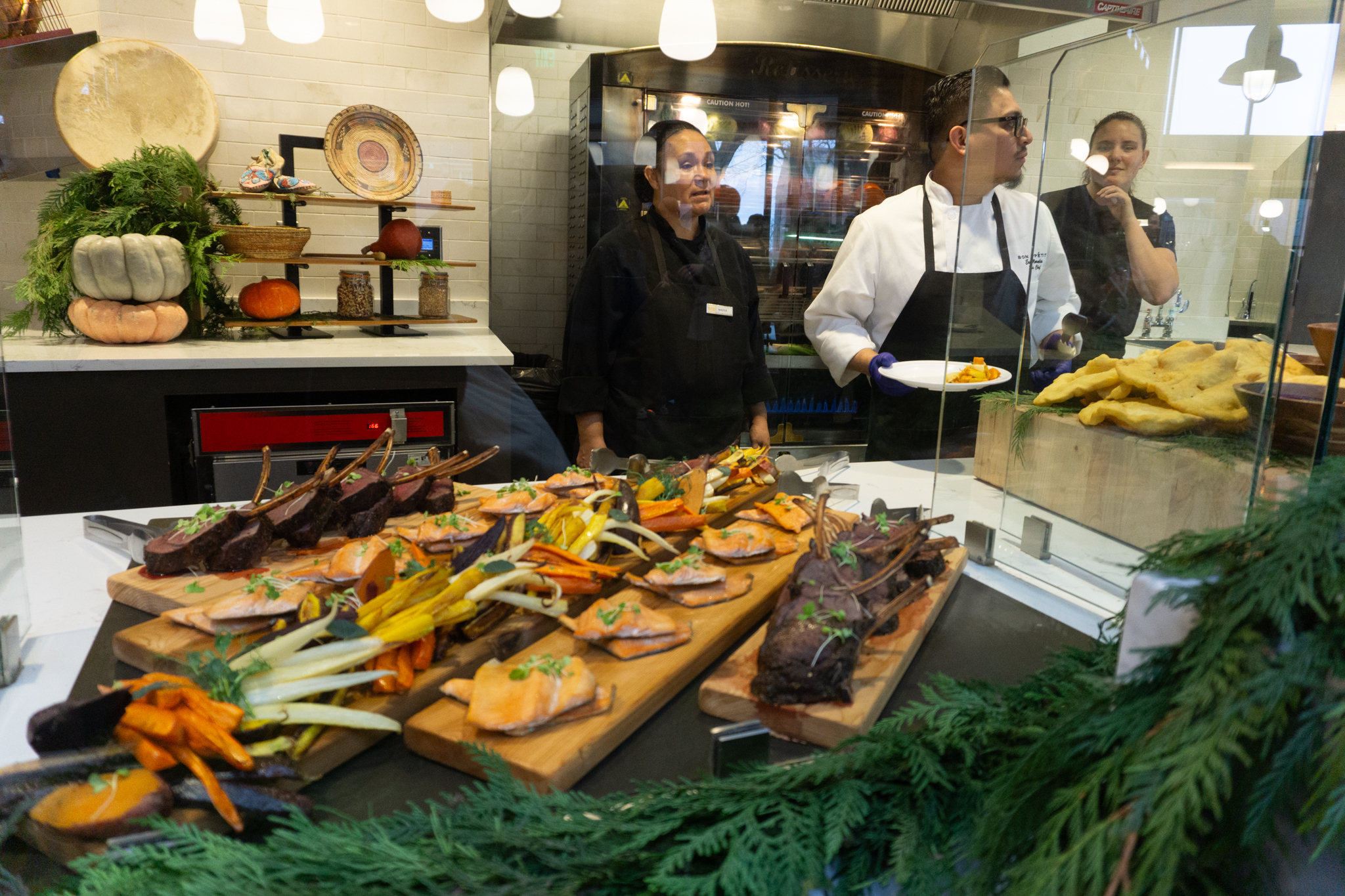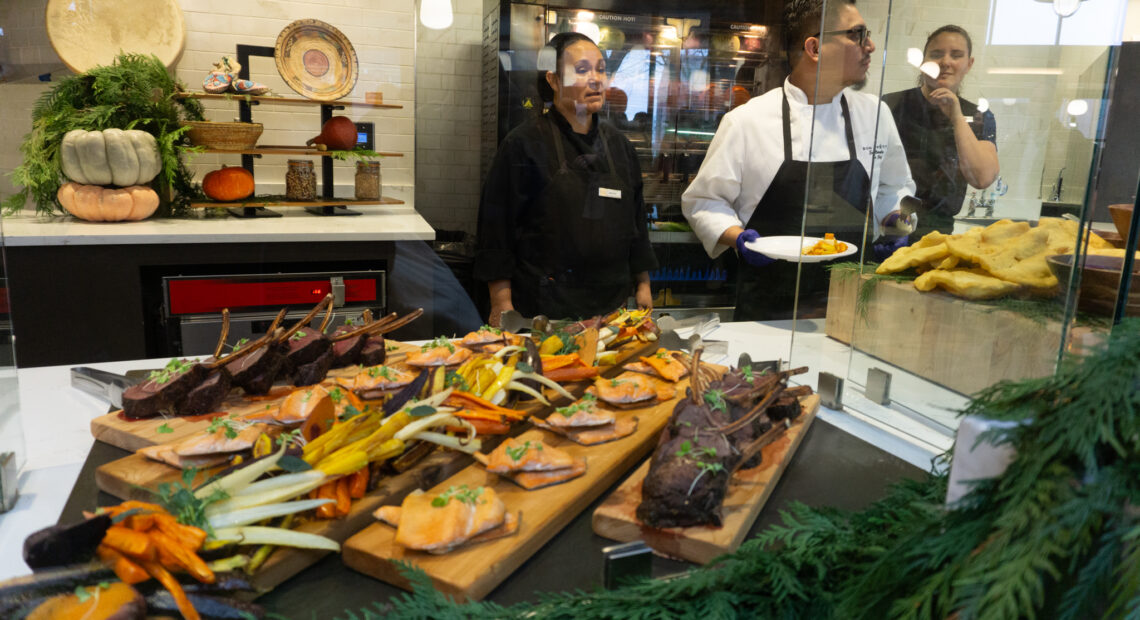
How Whitman College is reckoning with its past
Listen
(Runtime 4:00)
Read
On a recent Friday, the menu at Whitman College’s dining hall looked a little different than normal. There was roasted elk, fry bread with huckleberry jam, and cedar plank smoked rainbow trout.
These “first foods” are representative of the region’s Indigenous people. And Whitman College will now have a station highlighting them on the first Friday of every month.
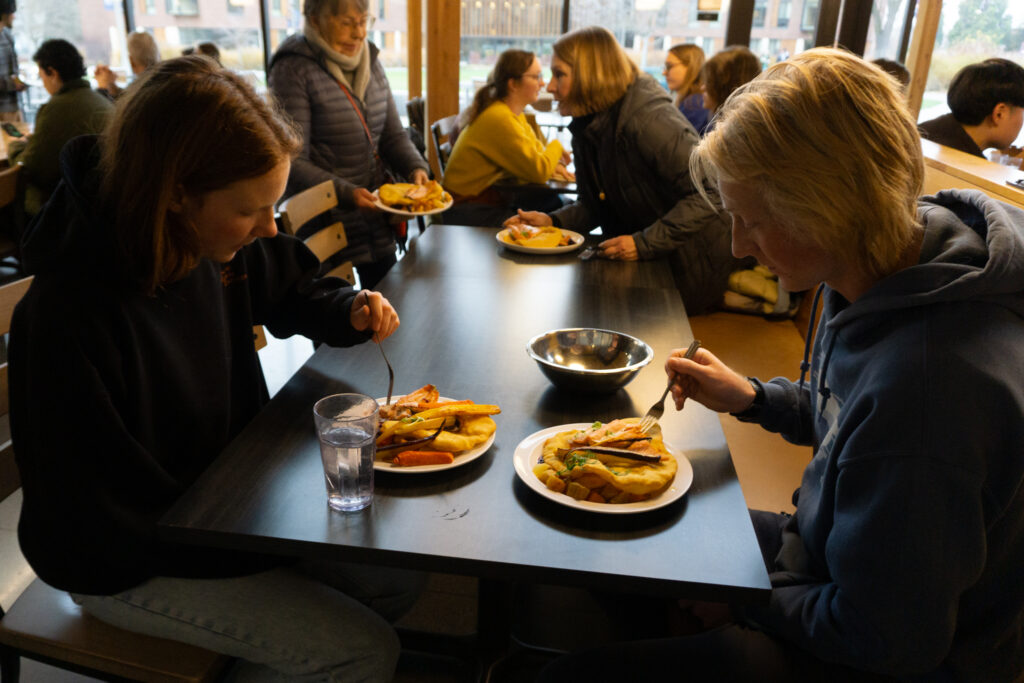
Annika Schwartz and Jack McManus, both sophomores at Whitman College, tried the first foods offered at the dining hall. (Credit: Susan Shain / NWPB)
In a speech at the launch, Shannon Null, the general manager of the college’s food service, said she believed it was the first college in the country to have such a station. Two of the dining hall’s chefs even underwent training at a tribal longhouse.
Like many institutions nationwide, Whitman College has been grappling with the complex legacy of its namesake. But the college has gone far beyond adopting a land acknowledgement.
One example is the first foods station. “This is pretty special,” said Jeanine Gordon, the first person to oversee Native American outreach for the college. “I think our ancestors are celebrating with us today.”
Gordon came on board in 2023, a year after the college re-signed a memorandum of agreement with the Confederated Tribes of the Umatilla Indian Reservation, or CTUIR, which is a union of the Cayuse, Umatilla and Walla Walla tribes.
“The intent of the memorandum of agreement is to get that collaborative relationship going and work toward supporting education and awareness of the history,” Gordon said. “Reckoning with the past, in my mind, means looking at that history from our tribal perspective.”
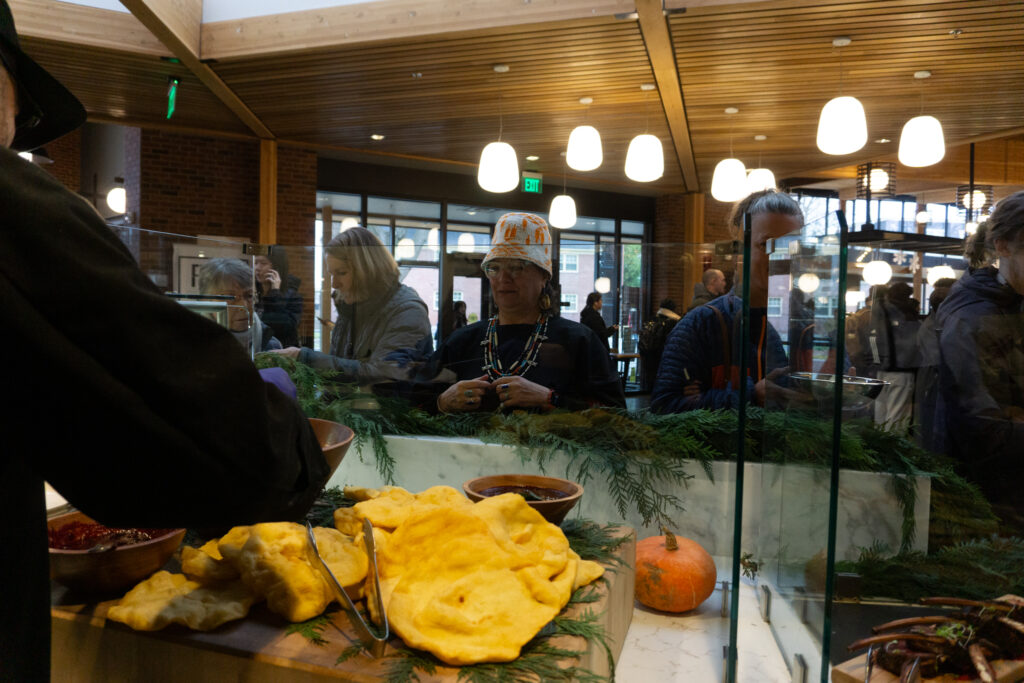
Jeanine Gordon, an enrolled member of the CTUIR who oversees Native American outreach for Whitman College, waits for fry bread. (Credit: Susan Shain / NWPB)
By that, Gordon was referring to the story of Marcus Whitman, for whom the college was founded. Whitman was an 1800s missionary who attempted to convert the Cayuse people — but wasn’t successful. In 1847, he and 12 other people were killed by a group of Cayuse men.
His death spurred the displacement of Northwest tribes off their land. Whitman became known as a tragic hero.
“I just grew up with the one sided story that everybody tells and hears — and us not being able to share our side,” said Gordon, who is Cayuse and Walla Walla, and an enrolled member of the CTUIR. “It brought a lot of villainism about us.”
Here’s Gordon’s perspective: The Cayuse welcomed Whitman, thinking his intention was to live in community. But he didn’t learn the Cayuse language or culture. Or even allow Native people in his home. He then began catering to — and profiting from — white immigrants settling in Cayuse territory. Immigrants who brought diseases that killed Natives by the hundreds.
The unraveling of Marcus Whitman, which has been helped along by books like “Murder at the Mission” and “Unsettled Ground,” has put the college in a tricky spot. Not only because of its name, but because it used the Whitman myth to fundraise itself out of bankruptcy in the 1890s.
“Whitman’s memory is very much central to the school’s, not just founding, but really its financial history,” said Sarah Koenig, an associate professor at Ramapo College of New Jersey and author of a book about Marcus Whitman.
In October, a campus statue of Marcus Whitman was once again vandalized, this time with the words “colonizer” and “land back.” Koenig noted that what is happening at Whitman College is a reflection of what is happening across the country.
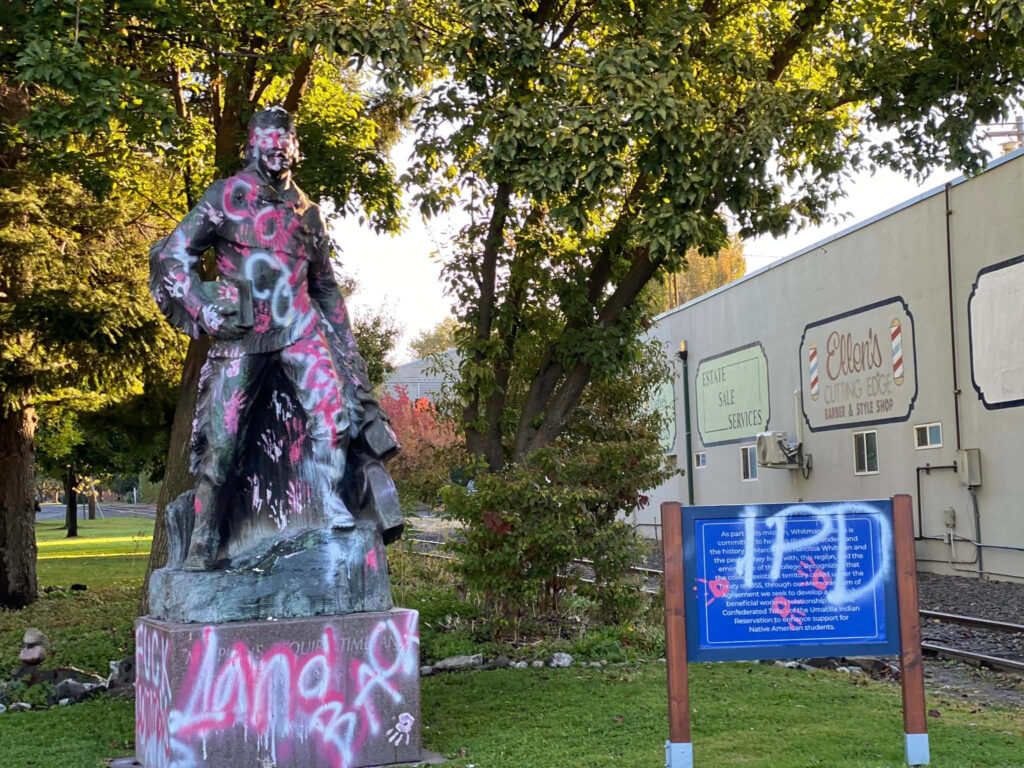
This fall, a Marcus Whitman statue on the edge of campus was vandalized with the words “colonizer” and “land back.” (Credit: Susan Shain / NWPB)
“We can correct the record in the books, but what about all this infrastructure that has been created around these mythologies?” she said. “What do we do with it?”
Whitman College’s answer, it seems, is outreach and education. In addition to signing the memorandum and hiring Gordon, it began hosting an annual pow-wow and first foods festival, as well as offering full rides to students affiliated with the CTUIR, through the Šináata scholarship.
Aiden Wolf was one of the first students to receive that scholarship. He descends from two Cayuse men who were executed for their alleged role in killing Marcus Whitman.
“So coming here, it was kind of strange to me,” said Wolf, who’s now a junior majoring in theater. But “I have really been grateful for how much Whitman has put into trying to make that history felt and told from our perspectives.”
There’s currently no limit to the number of Šináata scholars that the college will support. Administrators hope that, one day, there will be so many applicants that they will need to enforce a cap. Currently, the student body is less than 1% Native American.
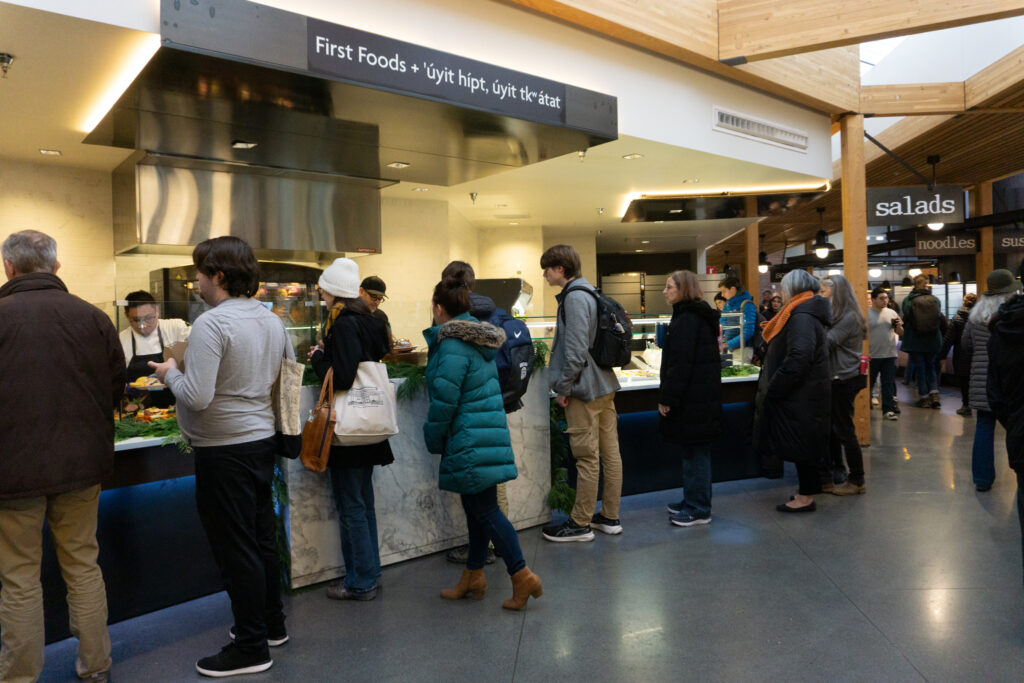
Students, faculty and staff lined up to try first foods at Whitman College. (Credit: Susan Shain / NWPB)
Kristen Parr, who is Walla Walla and Cayuse, said she’s seen more Native students consider Whitman College in recent years. “It really does make people feel comfortable when they can see themselves represented in a place like this,” she said.
Parr works in the language department for the CTUIR. She drove about an hour from the reservation to see the first foods station launch.
Parr teaches the Weyíiletpuu language, which was included on the first food station’s sign. She got a little emotional at its unveiling. “People are doing these land acknowledgments everywhere you go,” she said. But this, she said, was an example of action.
“Being able to be represented here is an accomplishment — it’s almost like reparations a little bit,” she said. “It’s really just a representation of how far we’ve come.”

